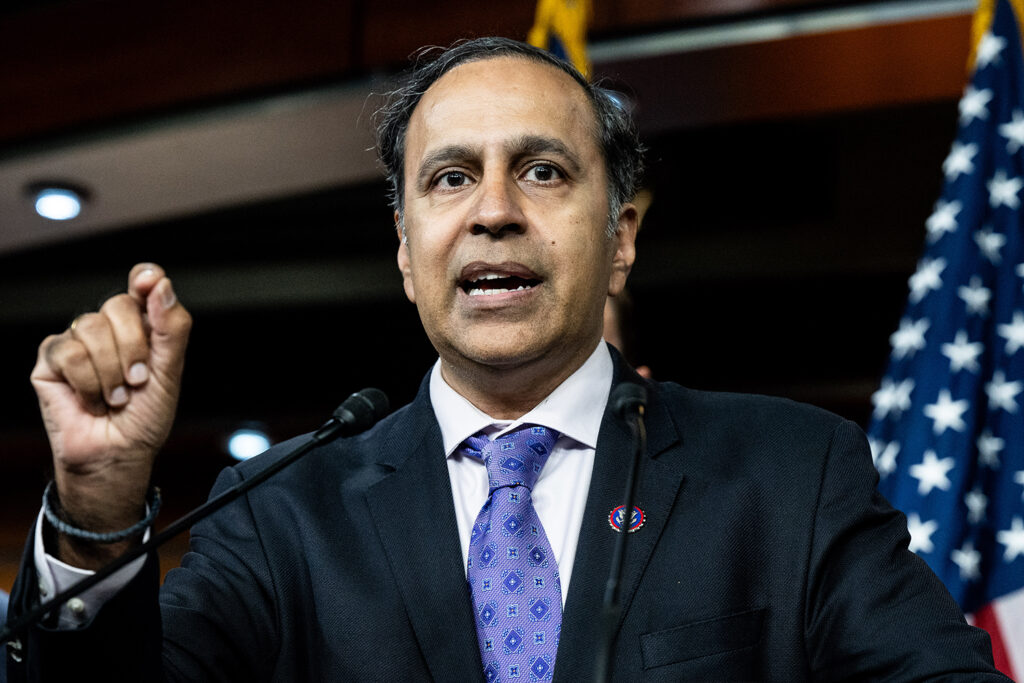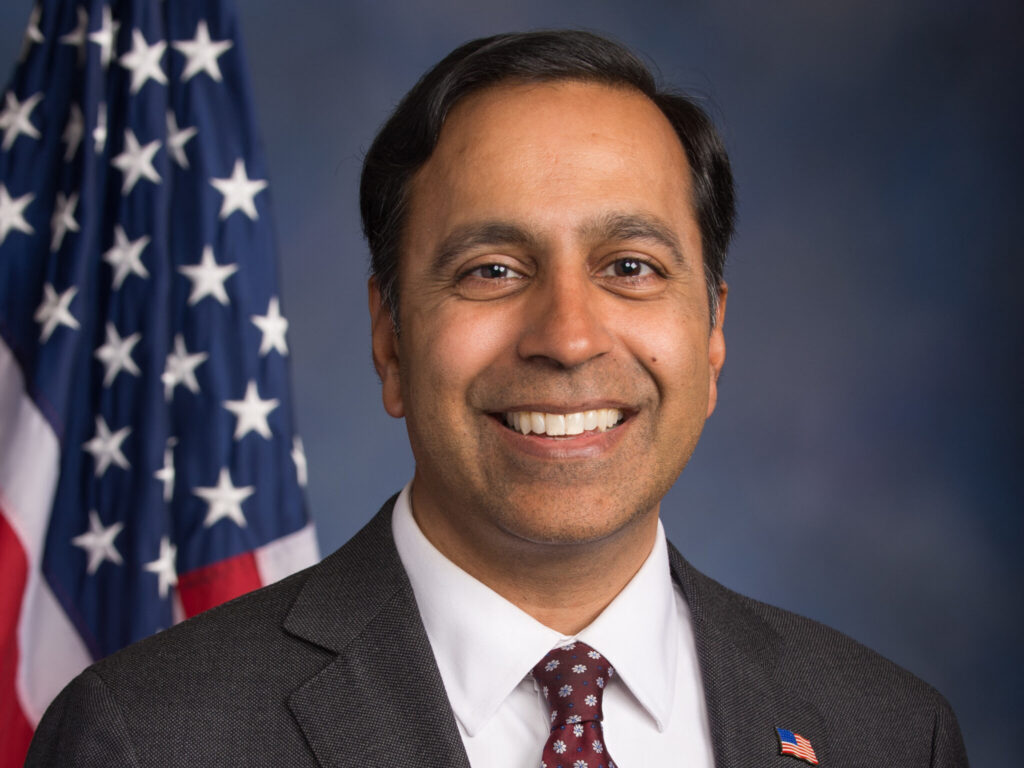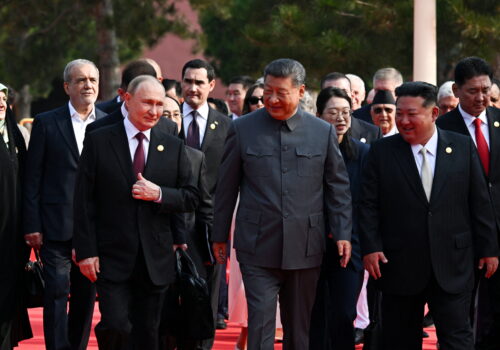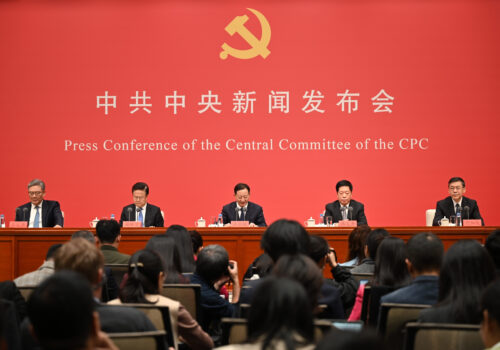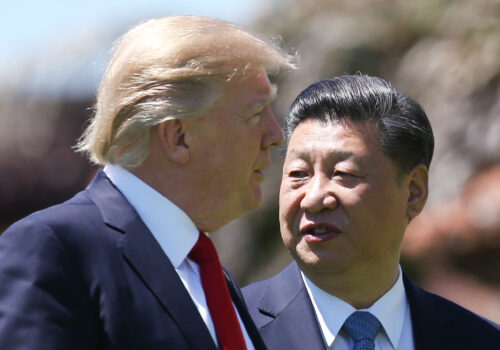Watch the event
US President Donald Trump “has leverage” with Chinese President Xi Jinping, said US Congressman Raja Krishnamoorthi (D-IL). “He needs to be able to use it.”
Krishnamoorthi spoke at an Atlantic Council Front Page event on Wednesday, ahead of Trump and Xi’s meeting in South Korea, saying that he hoped Trump would “show strength” at the meeting and use his leverage to “curb” certain Chinese Communist Party (CCP) practices. He pointed to Beijing’s dumping practices, intellectual-property theft, and use of forced labor—practices he said allow China to monopolize markets, then wield that power “as a source of coercion for other purposes.”
The congressman argued that the US president “has some trump cards” that can help in negotiations, the biggest card being US market access. “The CCP desperately wants access to the American market,” noted Krishnamoorthi, who is also the ranking member of the House Select Committee on the Chinese Communist Party.
But Trump shouldn’t grant complete access, Krishnamoorthi cautioned, particularly when it comes to high-end semiconductors. “We should do everything in our power to maintain restrictions . . . on the export of those semiconductors,” he warned, because of the technology’s role in military tools and surveillance.
Below are more highlights from the conversation, moderated by Matthew Kroenig, vice president and senior director of the Atlantic Council’s Scowcroft Center for Strategy and Security, in which Krishnamoorthi outlined the outcomes he’d like to see from the meeting and his take on US policy toward China.
Triple play
- Krishnamoorthi said that there are three “wins” on the table for Trump to take. One would be “stability in the trading relationship,” such that, for example, “farmers here in Illinois aren’t seeing zero purchases of their soybeans” by China.
- “Another win,” he continued, “would be making sure that we do something about their practice of dumping.”
- One final win, according to Krishnamoorthi, could be “concrete steps to lower the export of fentanyl precursors, which are fueling our fentanyl epidemic in the United States.”
- Krishnamoorthi said that if Trump can reach some sort of deal on TikTok, he should make sure it abides by the law passed last year by Congress that mandates ByteDance own less than 20 percent of the new entity taking ownership of the social media app in the United States.
- The congressman said that he thinks Xi will offer up “massive new investments in the United States,” but warned that if such deals get finalized, the Committee on Foreign Investment in the United States (which screens such investments) “needs to work better.” He suggested legislation to “beef that up” and “make it more efficient and effective.”
Show of strength
- Krishnamoorthi warned that Trump should be careful not to “sell out” US allies—including Taiwan, Japan, South Korea, and the Philippines—in pursuit of any deal. “Our superpower,” he said, relies on “our alliances, friendships, and partnerships in the region.”
- Taiwan, he added, should be “off the table” as a topic of discussion, and Krishnamoorthi advised the president to remain “firm” in maintaining the One China policy and sticking to the United States’ Six Assurances to Taiwan.
- Krishnamoorthi added that he is “concerned” about how the United States is “lowering” its “deterrence” against the CCP’s methods of aggression. For example, he pointed to US delays on the shipments of arms to Taiwan and reports that the Trump administration told the Taiwanese president not to transit through the United States earlier this year.
- “We are basically signaling to the CCP and to Xi Jinping that somehow our commitments to stability in the region and our commitments to Taiwan are wavering,” the congressman warned.
- “Xi Jinping is no slouch, and we have to expect that he is going to try to take advantage of any weakness that we might show either in what we say or what we do,” he said.
What US policy is getting wrong on China
- Krishnamoorthi warned that Trump’s Liberation Day tariff announcement “was a disaster” because, in addition to starting a trade war “we weren’t ready for,” it “pushed our friends, partners, and allies away.”
- The congressman also raised questions about the US approach to the technology race with China, arguing that the Trump administration’s health and science funding cuts and measures to limit immigration, including of highly skilled individuals, “are basically hurting our technology ecosystem in a profound way.”
- “Our [tech] leadership is eroding because we’re not investing in ourselves,” he argued. “The CCP notices that, and that’s in part why they’re trying to poach talent from us” in the form of a new specialized visa, he added. “We’ve got to fix that . . . It’s vital for winning the strategic competition with the CCP.”
Katherine Golden is an associate director of editorial at the Atlantic Council.
Watch the event
Further reading
Mon, Oct 27, 2025
Trump’s place in history depends on his approach to the CRINK
Inflection Points By Frederick Kempe
After a string of foreign policy wins, Trump's more significant challenge lies ahead: countering the bloc of China, Russia, Iran, and North Korea.
Fri, Oct 24, 2025
The winners and losers from China’s next five-year plan
New Atlanticist By Jeremy Mark
In Beijing, the Chinese Communist Party’s Central Committee met this week to move forward the country’s fifteenth five-year plan.
Sun, Oct 12, 2025
As the trade war resumes, China may be keeping one eye on Trump and one on the Supreme Court
New Atlanticist By Josh Lipsky
The US president’s leverage with Xi Jinping could be undercut by the Supreme Court's deliberations.
Image: US Representative Raja Krishnamoorthi (D-IL) speaks about the Protecting Americans from Foreign Adversary Controlled Applications Act (i.e. TikTok) at the US Capitol. Photo by Michael Brochstein/Sipa USA via Reuters.
